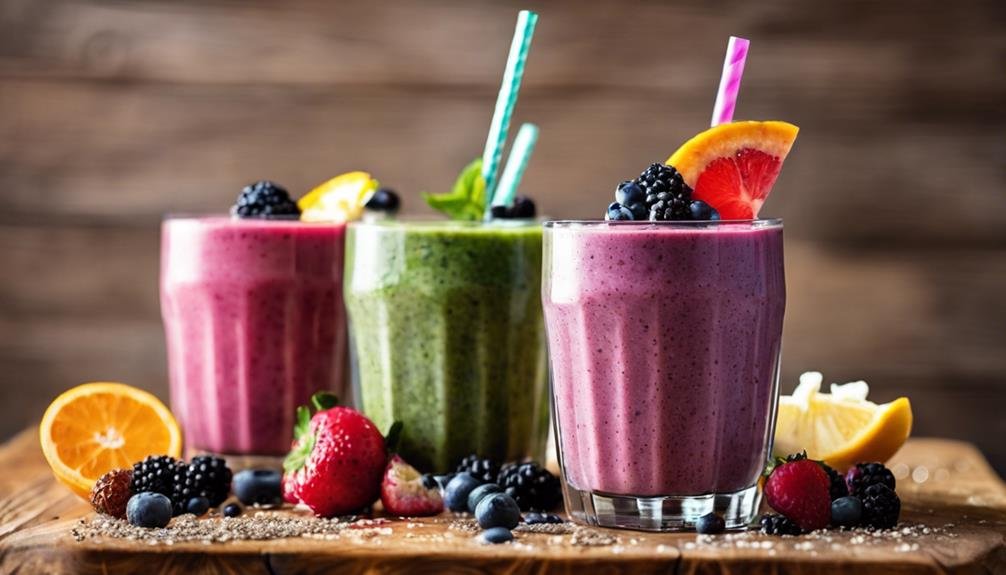"Cherishing Little Steps - A Haven for Baby and Family Journeys"
How to Boost Collagen Production Naturally
If you're seeking ways to naturally enhance collagen production, making simple adjustments to your daily routine can yield significant benefits. By incorporating specific foods, skincare practices, and lifestyle modifications, you can effectively support your body's collagen synthesis. These methods are not only easy to implement but can also lead to noticeable improvements in skin health and overall well-being. By exploring these natural strategies, you may uncover the key to unlocking your skin's youthful radiance and resilience.
Importance of Collagen for Skin Health
Collagen plays a crucial role in maintaining the health and appearance of your skin. This structural protein provides essential benefits for skin elasticity, keeping it firm, smooth, and youthful. As you age, collagen production naturally declines, leading to the development of fine lines, wrinkles, and sagging skin. By understanding the significance of collagen in skin health, you can take proactive steps to support its production and maintain a radiant complexion.
Skin elasticity, a key aspect influenced by collagen, refers to the skin's ability to stretch and bounce back. Collagen fibers in the dermis provide structural support, helping the skin maintain its firmness and flexibility. When collagen levels are optimal, your skin appears plump and resilient, reducing the visibility of wrinkles and promoting a more youthful appearance.
To enhance skin elasticity and harness the benefits of collagen, incorporating healthy lifestyle choices, skincare products, and dietary supplements can play a pivotal role. By prioritizing collagen support, you can nurture your skin from within, promoting long-term skin health and vitality.
Nutrient-Rich Foods for Collagen Synthesis
Maintaining optimal collagen levels for skin health involves more than just skincare products; it also requires attention to your diet. Including nutrient-rich foods in your daily meals can support collagen synthesis naturally. To boost collagen production, consider incorporating collagen-boosting recipes into your diet and focusing on plant-based collagen sources.
Here is a table highlighting some plant-based foods that can help support collagen production:
| Plant-Based Collagen Sources | |||
|---|---|---|---|
| Spinach | Bell Peppers | Almonds | Chia Seeds |
| Berries | Tomatoes | Avocado | Pumpkin Seeds |
| Soy Products | Beans | Lentils | Quinoa |
| Tofu | Broccoli | Sweet Potatoes | Oranges |
| Walnuts | Garlic | Cucumber | Flaxseeds |
Effective Skincare Habits to Support Collagen

To effectively support collagen production and maintain skin health, it's crucial to establish a consistent skincare routine that incorporates habits known to promote collagen synthesis. Maintaining skin elasticity is key to achieving a youthful appearance and reaping anti-aging benefits.
Start by cleansing your face twice daily with a gentle cleanser to remove impurities without stripping the skin of its natural oils. Follow up with a toner to balance the skin's pH levels and prepare it for better absorption of subsequent products.
Incorporate a vitamin C serum into your routine, as it's known to boost collagen production and protect the skin from environmental damage. Hydrate your skin with a moisturizer containing hyaluronic acid to maintain its elasticity and plumpness.
Lifestyle Changes to Enhance Collagen Production
To further enhance collagen production and support skin health, implementing certain lifestyle changes can play a significant role in maintaining a youthful appearance and combating signs of aging.
Regular exercise benefits not only your overall health but can also boost collagen production. Engaging in activities like strength training, yoga, or cardio can promote circulation and stimulate collagen synthesis, helping to keep your skin firm and supple.
Additionally, stress management is crucial for collagen production. High levels of stress can lead to increased production of cortisol, which can break down collagen and accelerate aging. Incorporating relaxation techniques such as mindfulness, meditation, or deep breathing exercises can help reduce stress levels and support healthy collagen levels in your skin.
Natural Supplements for Boosting Collagen

For naturally enhancing collagen production and supporting skin health, incorporating natural supplements into your routine can provide additional benefits. When selecting natural supplements to boost collagen, it's important to follow best practices by choosing top choices that are backed by research and known for their effectiveness.
Two of the top choices for natural supplements that can help boost collagen production are vitamin C and collagen peptides.
Vitamin C is a powerful antioxidant that plays a key role in collagen synthesis. By adding a vitamin C supplement to your daily routine, you can support your body's ability to produce collagen and maintain skin elasticity.
Collagen peptides are another popular supplement known for their ability to improve skin hydration, elasticity, and firmness. These supplements can help enhance your body's collagen production, leading to healthier and more youthful-looking skin.
Incorporating these natural supplements into your daily regimen, alongside a healthy diet and skincare routine, can help you achieve optimal collagen production and support overall skin health. Remember to consult with a healthcare professional before starting any new supplement regimen.
Frequently Asked Questions
Can Collagen Supplements Cause Any Side Effects?
Yes, collagen supplements can have side effects, including digestive issues or allergic reactions. To enhance safety, consider natural alternatives like vitamin C-rich foods, bone broth, or incorporating collagen-boosting ingredients in your diet for optimal results.
How Long Does It Take to See Results From Collagen-Boosting Foods?
You'll typically start noticing improvements from collagen-boosting foods in about 4-6 weeks. Incorporating sources like bone broth, fish, and berries into your diet can offer collagen benefits over time, enhancing your skin's health and elasticity.
Are There Any Specific Exercises That Can Help Increase Collagen?
To increase collagen, try specific yoga poses that stimulate blood flow and promote skin health. Additionally, facial massages can enhance collagen production by boosting circulation and promoting collagen synthesis. Incorporate these practices into your routine for optimal results.
Can Stress Levels Affect Collagen Production in the Body?
When stress hormones rise, they can impact collagen production in your body, affecting skin elasticity. Managing stress through relaxation techniques like meditation or yoga can help maintain healthy collagen levels and promote youthful-looking skin.
Is It Possible to Have Too Much Collagen in the Body?
Hey there, having too much collagen in your body can indeed be possible. It's all about finding that sweet spot – the right collagen levels that keep your skin supple and joints healthy. Balancing is key!
Conclusion
In conclusion, boosting collagen production naturally is key to maintaining youthful and healthy skin. Did you know that collagen makes up about 75% of our skin's dry weight? By incorporating nutrient-rich foods, effective skincare habits, lifestyle changes, and natural supplements into your routine, you can support collagen synthesis and promote overall skin health. Stay committed to these practices to enjoy the benefits of plump and radiant skin for years to come.




